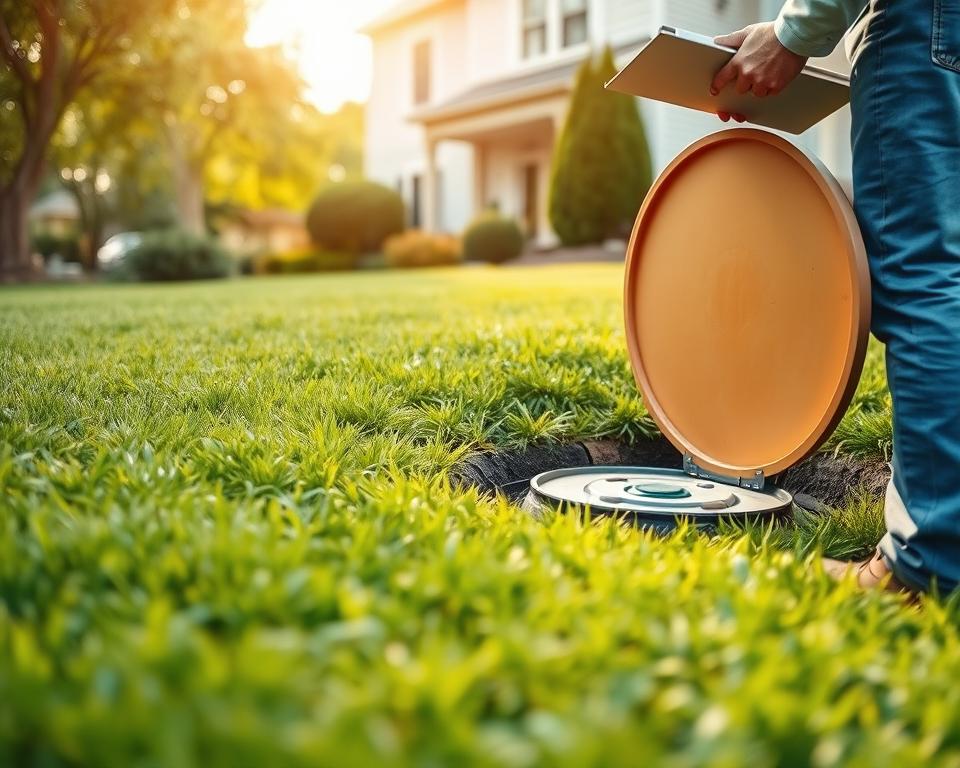Septic System Pumping
Have you ever wondered how often you should schedule septic system pumping to avoid expensive breakdowns? With over 20 percent of U.S. households depending on septic systems, understanding their maintenance is vital. Pinpointing the right time to order a septic tank service is paramount to its lifespan. Additionally, homeowners have access to budget-friendly septic pumping solutions that deliver high-quality functionality without overspending. Below, we outline critical upkeep advice useful for every homeowner.
Crucial Summaries
- Routine septic system pumping is essential for optimal functioning.
- Spotting the signs that suggest the need for service can head off major issues.
- Hiring qualified septic system pumpers guarantees reliable maintenance.
- Cost-effective septic pumping options are accessible for homeowners.
- Periodic inspections promote optimal system performance.
Understanding Your Septic System
A septic system serves a crucial role in handling household wastewater, consisting of several important components that work collectively. The initial drain line carries wastewater from your home to the septic tank, where the process starts. In the tank, an underground chamber, solids sink at the bottom, and bacteria break down these solids, treating the waste thoroughly.
The clarified liquid effluent next travels from the septic tank to the distribution box, where it is distributed evenly across the drain field or leach field. Here, the soil carries on with the filtration, additionally purify the wastewater. Comprehending the functions of these septic system parts is critical. It allows homeowners to monitor and upkeep their systems efficiently.
Knowing how your septic system runs helps you implement proactive maintenance measures. It’s wise to have regular check-ins with qualified cleaners of septic systems – septic tank pumping services. They offer crucial insights for peak operation of your system. These specialists help in planning the necessary pump-outs and checks. This diligence can significantly lengthen your septic system’s lifespan.
The Value of Septic System Care
Keeping your septic tank regularly is pivotal for homeowners who want their system to last. A well-cared-for system offers peace of mind and protects your property’s value. Without proper care, you’re exposing yourself to system breakdowns and health dangers.
Choosing a first-rate septic pumping service is crucial. They deliver timely inspections and pump-outs, extracting sludge and scum buildup. If maintenance is ignored, emergency pumping may be required, which is expensive.
Following a regular maintenance plan is prudent. It involves professional evaluations and regular pumping. This preventative measure prevents urgent issues, ensuring a safer living environment for everyone.

Warning Signs for Septic Systems
Being alert to septic system issues can sidestep costly repairs and major damage. Common signs indicate when your system requires a check. These comprise:
- Delayed drains throughout the house
- Pooling water in the yard above the drain field
- Unpleasant odors near the septic tank or leach field
- Exceptionally lush grass growth in specific areas of your yard
These signs could point to problems that might result in your system failing. Prompt action is essential. Reaching out to septic pumping specialists for an inspection helps. Timely action stops initial issues from growing into large ones. Additionally, regular upkeep secures your system works well and remains durable.
Septic System Pumping: Best Practices
Proper pumping of your septic tank is essential to sidestep hefty clogs and backups. It’s important to determine the ideal frequency for maintenance. Homeowners should generally schedule pumping every 2 to 5 years, subject to the tank’s size and household wastewater levels. Heavy use of garbage disposals may demand more frequent pumping.
Employing professional pumpers means your tank gets a thorough clean and check-up. During pumping, specialists look for any issues, such as faulty baffles. Detecting these problems at an early stage heads off bigger expenses and inconveniences later. Regular pumping schedules and expert help secure your septic system’s smooth operation.
Why Routine Inspections Matter
Routine inspections are vital for your septic system’s efficiency. Septic system inspections reveal small issues before they grow. Professionals advise inspections every three to five years, depending on system size and household usage. This sidesteps costly fixes.
Maintaining maintenance records is crucial for documenting your system’s condition. These records offer insights into previous inspections, repairs, and the right time to schedule septic tank cleaning services. With this information, organizing for future upkeep becomes simpler, maintaining septic systems in prime shape.
Frequent inspections and detailed record-keeping not only enhance system efficiency but also prolong its life. This strategy secures the environment and the investment in a safe, operational home.
| Inspection Type | Recommendation Frequency | Benefits |
|---|---|---|
| Visual Inspection | Annually | Identify surface issues |
| Professional Inspection | Every 3–5 years | Assess functionality and detect problems |
| Septic Tank Pumping | Every 3–6 years | Prevent overflow and system failure |
Efficient Water Usage to Extend Septic Life
Efficient water use is essential for keeping your septic system healthy. It not only supports the environment but also boosts the performance of your home’s plumbing. By practicing easy, yet effective, conservation methods, homeowners can reduce wastewater.
Space out your laundry activities over the week instead of running back-to-back loads. This allows the septic system to manage water better and stops tank overflow. Choosing low-flow fixtures in your kitchens and bathrooms yields considerable water savings, retaining the water pressure up while reducing the flow rate, thus lowering the amount of wastewater produced each day.
Promptly fixing leaks is another method to assist your septic system. Even a small leak can cause a large waste of water, stressing the septic system. Through regular inspections and repairs, you greatly aid the system’s efficiency.
Focusing on water conservation isn’t just beneficial for your septic system; it’s also a step towards environmentally responsible living. Making such practices into your daily routine serves both your household and the planet.
Managing Household Waste Correctly
Homeowners carry a vital role in preserving their septic system’s health by handling household waste appropriately. It’s essential to avoid flushing non-biodegradable items like wipes, plastics, and other hazardous products in the system. These items can cause clogs, leading to pricey repairs and a reduction in efficiency.
Composting food scraps and organic materials is a advantageous alternative to disposing of them conventionally. This practice markedly cuts down on the amount of solid waste entering the septic tank. Prioritizing biodegradable waste disposal supports the ecological balance needed for effective waste management.
It’s important to watch what goes down the drains. Non-decomposable items can requiredemand more frequent septic tank pumping. By understanding and adhering to correct waste disposal methods, you can ensure a more efficient and long-lasting septic system.
Choosing Septic-Friendly Cleaners
The health of your septic system depends significantly on your choice of cleaning products. Selecting septic-safe cleaning products is essential. These products shield the balance of beneficial bacteria that break down waste. Many standard cleaners contain harmful chemicals that jeopardize this balance, causing costly repairs or system failure.
Homeowners should look into natural alternatives that are both powerful and environmentally friendly. Common household items like baking soda, vinegar, and lemon juice are excellent choices. These natural cleaners are not only good at cleaning but also encourage your septic system’s health.
Keeping away from products that contain antibacterial agents and chlorine bleach is important. Such substances harm the essential good bacteria, weakening your system’s functionality. By picking sustainable products, you secure both the efficiency and longevity of your septic system.
Why Bacteria Matter in Septic Systems
Bacteria perform a key role in keeping your septic system efficient. They digest solids naturally and improve nutrient processing. A lack of healthy bacteria can cause system failure, bringing about costly repairs.
Homeowners can improve their system by introducing organic additives. These products boost beneficial bacteria, making waste decomposition more efficient. It’s important to select organic additives that are advantageous, not harmful, to the septic environment.
A healthy bacterial community is essential to a septic system’s longevity and efficiency. It prevents solid buildup and reduces the need for regular pumping. Emphasizing bacterial health creates waste management more effective and eco-friendly.
The Bottom Line
Septic system care is vital for the longevity and functionality of your home’s wastewater system. Following critical maintenance tips avoids costly repairs. Knowing routine pumping and inspections is paramount. This ensures your septic system keeps in top condition.
Becoming knowledgeable of your septic system’s operation and proper methods in water and waste management is vital. Engaging professionals like All in Sanitation delivers expertise. This helps secure your septic system’s long-term health and gives peace of mind.
Investing in proper septic maintenance today brings future benefits. It shields your home and enhances your family’s quality of life. Prioritizing septic system care provides confidence with a well-maintained system.

